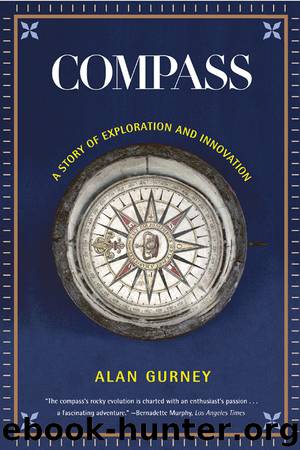Compass by Alan Gurney

Author:Alan Gurney
Language: eng
Format: epub
Publisher: W. W. Norton & Company
Published: 2016-09-29T04:00:00+00:00
* Her third mate and some other officers, appalled at their captain’s behavior, quit the ship in Bombay. After sailing for England from Bombay the Bridgewater was never heard from again.
Chapter 14
SOFT IRON, HARD IRON
Sir Joseph Banks, overweight, gout-ridden, and confined to a wheelchair, outlived Flinders by six years. But Flinders was not the only seaman to whom Banks had extended a helping hand and befriended with his patronage. Another such man was William Scoresby, who was whaling in the Arctic when Banks died in 1820. That the Royal Society’s president should have invited a whaler to his celebrated breakfasts and dinners, maintained a twelve-year correspondence with him, and then introduced him to influential men of science, is a cause for wonder. But Banks had a keen nose for the unusual intellect. And Scoresby was a most unusual man.
The son of a very successful Whitby whaling captain (also a William and, like the Deity, always capitalized as Father by his son), Scoresby had been baptized into the rigors of Arctic whaling (Father being the captain) at the age of ten. Three years after this precocious and frigid initiation, Scoresby’s education had settled down into a pattern. Summers were spent whaling in the Arctic, winters in more formal education at school in Whitby and then, in 1806, at Edinburgh University.
The summer prior to entering university he had sailed as chief mate aboard his father’s whale ship, the Resolution. On this voyage, sailing through loose pack ice north of Spitzbergen, they had reached 81°30' North, a unique situation that made the Resolution’s crew the most northerly people in the world. In these high latitudes the Scoresbys noted the sluggish behavior of the compasses and the large magnetic variations. It was this, no doubt, that caused Scoresby to write to his son at Edinburgh that he should take every “opportunity to know the best method of giving power to the magnet and charging the needle of the compass.” But Father was in the habit of bombarding his son with parental advice. The ten volumes of Shakespeare sent to him at university had not been provided for William to gain “a thirst for the theatre,” but to learn from the “language that runs through the whole,” even though the language was “poor in itself compared with divine writings.”
At Edinburgh the dark-eyed Scoresby, tall, slight of build, with curling dark hair framing a mobile and intelligent face, came under the wing of Professor Robert Jameson. The professor, intrigued by having a whaler as a student, encouraged Scoresby in his study of the Arctic’s natural history. One of the unforeseen results was that Jameson, much to his perplexity as to the housing and feeding of the animal, received a polar bear as a present. The other result was the publication, in 1820, of Scoresby’s An Account of the Arctic Regions. The two volumes, which are considered the foundation stone of Arctic science, were dedicated to Jameson.
All aspects of the Arctic, from plants to the sea, came under the scrutiny of Scoresby’s inquiring mind.
Download
This site does not store any files on its server. We only index and link to content provided by other sites. Please contact the content providers to delete copyright contents if any and email us, we'll remove relevant links or contents immediately.
| Automotive | Engineering |
| Transportation |
Small Unmanned Fixed-wing Aircraft Design by Andrew J. Keane Andras Sobester James P. Scanlan & András Sóbester & James P. Scanlan(32800)
Navigation and Map Reading by K Andrew(5156)
Endurance: Shackleton's Incredible Voyage by Alfred Lansing(4780)
And the Band Played On by Randy Shilts(2205)
The Box by Marc Levinson(1996)
Top 10 Prague (EYEWITNESS TOP 10 TRAVEL GUIDES) by DK(1987)
Wild Ride by Adam Lashinsky(1974)
The Race for Hitler's X-Planes: Britain's 1945 Mission to Capture Secret Luftwaffe Technology by John Christopher(1868)
The One Percenter Encyclopedia by Bill Hayes(1826)
Trans-Siberian Railway by Lonely Planet(1755)
Girls Auto Clinic Glove Box Guide by Patrice Banks(1728)
Bligh by Rob Mundle(1693)
Looking for a Ship by John McPhee(1675)
Good with Words by Patrick Barry(1660)
Batavia's Graveyard by Mike Dash(1655)
TWA 800 by Jack Cashill(1652)
Fighting Hitler's Jets: The Extraordinary Story of the American Airmen Who Beat the Luftwaffe and Defeated Nazi Germany by Robert F. Dorr(1632)
Troubleshooting and Repair of Diesel Engines by Paul Dempsey(1601)
Ticket to Ride by Tom Chesshyre(1589)
